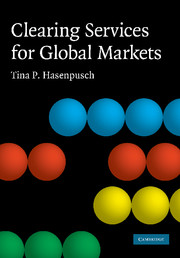 Clearing Services for Global Markets
Clearing Services for Global Markets Book contents
- Frontmatter
- Contents
- List of figures
- List of abbreviations
- Acknowledgements
- Foreword
- 1 Introduction
- 2 Setting the stage – definitions and industry setting
- 3 Defining the core issues – efficiency and network strategies
- 4 Collecting empirical insights – introduction to the empirical study
- 5 Analysing costs of derivatives clearing – transaction cost studies
- 6 Exploring theoretical basics – scale effects in clearing
- 7 What theory reveals – framework for efficiency analysis of network strategies
- 8 Checking theory against reality – case studies of network strategies
- 9 Quantifying the efficiency impact – European network strategies
- 10 Introducing the future network economy – development of the clearing industry
- 11 Summary, discussion and recommendations for future research
- Appendices
- Bibliography
- Index
4 - Collecting empirical insights – introduction to the empirical study
Published online by Cambridge University Press: 19 January 2010
- Frontmatter
- Contents
- List of figures
- List of abbreviations
- Acknowledgements
- Foreword
- 1 Introduction
- 2 Setting the stage – definitions and industry setting
- 3 Defining the core issues – efficiency and network strategies
- 4 Collecting empirical insights – introduction to the empirical study
- 5 Analysing costs of derivatives clearing – transaction cost studies
- 6 Exploring theoretical basics – scale effects in clearing
- 7 What theory reveals – framework for efficiency analysis of network strategies
- 8 Checking theory against reality – case studies of network strategies
- 9 Quantifying the efficiency impact – European network strategies
- 10 Introducing the future network economy – development of the clearing industry
- 11 Summary, discussion and recommendations for future research
- Appendices
- Bibliography
- Index
Summary
To gain insight into the practical relevance and nature of the different cost categories for various clearing member types as well as to derive a basis for analysing the impact network strategies have on clearing costs, the author conducted a comprehensive original empirical study. The original study was also necessary because relevant cost data is not publicly available, and published evidence is scarce at best. Additionally, as the European Commission has observed, ‘[t]he pricing of post-trading services is complex. Several studies have attempted to shed some light’. Nonetheless, as outlined in section 1.2, none of these studies delivers a universally accepted and accurate description of clearing costs.
This study's original empirical component therefore serves to provide the necessary basis for analysing the costs of derivatives clearing in general and the efficiency impact of European network strategies in particular. The aim of this chapter is fivefold: to describe the underlying data (section 4.1); to detail the method of data collection and explain the process and timeline of the empirical study (section 4.2); to present the study's structure and component parts (section 4.3); to describe the data treatment and interpretation (section 4.4); and to discuss the quality of the expert inquiry (section 4.5). Finally, a summary is provided on the purpose and use of the empirical insights (section 4.6).
- Type
- Chapter
- Information
- Clearing Services for Global MarketsA Framework for the Future Development of the Clearing Industry, pp. 119 - 132Publisher: Cambridge University PressPrint publication year: 2009


